
by Solange Lopes | Aug 21, 2018 | Career
I was at work, in my zone, checking box after box of deliverables when my cell phone rang. It was home. I couldn’t pick up; besides, I was in the flow and didn’t want to stop just yet. The phone kept ringing, over and over again. “It must be important”, I thought. I needed to take a biological break anyways, so I picked up, walking towards the ladies’ room by the corridor. The rest was a blur, as the news I received dealt me a physical blow so hard I had to sit on the carpeted floor for a few minutes.My grand-mother had just passed away, and I was hearing the news all the way from West Africa. Saying that I was devastated was an understatement. Memories kept flooding my mind, as I desperately fought to find a way to get it together in the office.
Like me, you may have faced a personal crisis at work. It may have been the loss of a loved one. Or the crushing end of a marriage. Or a friendship imploding. Whatever it may have been, a personal crisis can be amplified and made almost impossible to manage when you have to handle being at work throughout part or the entirety of the process.

Besides, personal challenges and crisis affect the way you see and think about work. When you experience loss, your career suddenly takes a backseat, and rightfully so. In Bridget Jones, Bridget leaves her job after finding out her boyfriend cheats on her (it also didn’t help that he was his boss). There are many scenarios, some of them in our favorite movies, when people change their whole careers after a personal crisis.
When personal crisis hits and everything seems to fall apart as the monthly report is due and the boss is breathing down your neck, you don’t have to fall apart. Here are a few ways to keep standing when the world is crashing down around you:
-
Take a time-out
Dealing with your emotions and feelings when you’re going through a personal crisis is not a luxury, it’s a necessity! Whether you take a personal day or use your vacation or bereavement time, make sure to observe some time to grieve over whatever you may be experiencing!
Related: 3 ways to manage your emotions at work as a working woman
It may be time to mourn over the loss of a dear one, to get over a marriage crisis, or simply to absorb some delicate financial or health-related news. Whatever it may be, not taking the time to do so will end up having repercussions on your life and work in the short and long-term.
-
Communicate!
As an introvert, I always find it challenging to communicate when facing a personal crisis, especially at work. However, we must understand that our relationships, whether personal or professional, do not necessarily understand what we may be going through.
This is why it’s so important to open the communication gates and allow those around you, to understand what you are facing. This is not about telling everyone your personal business, but rather opening lines of communication to facilitate a process that is already challenging for you.
-
Consider your options
When facing a personal crisis at work, you must consider your available options. You may be able to take some time off, use bereavement time, or even access some mental health resources offered by your organization. However, if you don’t know about these or fail to consider them, you may be putting yourself at a disadvantage.
While it may be challenging to do so, consider consulting with your Human Resources department. You can also talk to co-workers and friends to evaluate your options.
-
Focus on healing
As important as work may be to you, your healing and health, both physical and mental, takes precedence. Focus on your well-being, and recovering from whatever crisis you may be facing. If it requires taking some time off, then so be it.
Don’t be afraid to communicate your needs during this process. The more you can work at emerging from the crisis you may be facing, the better you can be in life and at work.
-
Make a plan
Facing a personal crisis at work takes a toll on you. The longer the crisis remains unsolved, the more it affects you personally and professionally. As difficult as it may be, make a plan to deal with this crisis. This may mean having a plan to take some time off, using some of the resources offered by your organization, taking a loan out of your savings, or any other type of plan.
Committing to a few steps to turn the crisis you may be facing can go a long way towards healing and actually learning from the experience. If you can trust your co-workers and management, you may consider asking them to help you through your plan and keep you accountable.
-
Stand up for yourself…
There are times when you may have to face a personal crisis at work alone. Your co-workers or management may not necessarily understand or empathize with what you may be going through. You may also be hesitant to share your process and experience with them. You may even face opposition or flat-out resentment from those you work with. This may be the case when you need to take some time off, go on a leave, or be more flexible in your schedule, as it may also impose additional demands on your team or department.
In these cases, as challenging as it may be, you may want to stand up for yourself and exercise your rights. Make sure to collaborate with your team as much as possible in the process. However, you must take care of yourself first, even if that means standing up to your team or organization for the sake of your well-being.
-
But be kind to you!
Facing a personal crisis at work is painful. As much as you may want others to show compassion and kindness to you, you must be kind to yourself first. This also means assessing your needs as honestly as you can, and allowing yourself the time and space to heal.
All in all, we may all at some point or another, face a personal crisis at work. Life just happens, and sometimes everything falls apart. In these cases, the most important thing to remember is that at the end of the day, our health, sanity and well-being comes first.
Now your turn: Have you faced a personal crisis at work? How did you deal with it?
To Your Success,
The Corporate Sister.

by Solange Lopes | Apr 25, 2018 | Career

This post is sponsored by BabbleBoxx.com on behalf of the Paper +Packaging Board #ad
As a professional or an entrepreneur, how many times have you felt overwhelmed by technology? Do you often seek a respite from the onslaught of apps, alerts, and other tools that are supposed to increase your productivity but instead diminish it? And how many times have you had to put your smartphone away to focus on the task at hand or avoid a disaster (hello, distracted driving!)? I know I have, many times over…Truth is, in the midst of our distraction-prone, tech-addicted, multi-tasking society, focusing and being your most productive self can be a challenge. Yet, it really can be as simple as going back to the basics and… putting pen to paper.
I grew up in Senegal, West Africa, at a time when simplicity was a way of life. If you missed a phone call, you wouldn’t know until you got home (and that’s if you even had a phone at home). Tests were administered on paper, and you didn’t have to fear a technical glitch would mess up your entire day. While I didn’t realize it then, this simplified way of life that promoted note-taking and limited distractions also helped with learning faster in general. According to this Psychological Science study, the process of taking notes significantly improves learning and information retention.
There’s just something about pen and paper that instantly warms my heart. Some of my best childhood memories involve paper of some sort. As a busy working mom, I watch my own daughter collect journals, notebooks and pens with nostalgia and a renewed appreciation for the gift of paper in work and life. While it may seem that smartphones, apps and other electronic gadgets are taking over our lives, the truth is, putting pen to paper is still one of the best ways to learn, be our most productive selves, and enjoy the process of creativity and life in general:
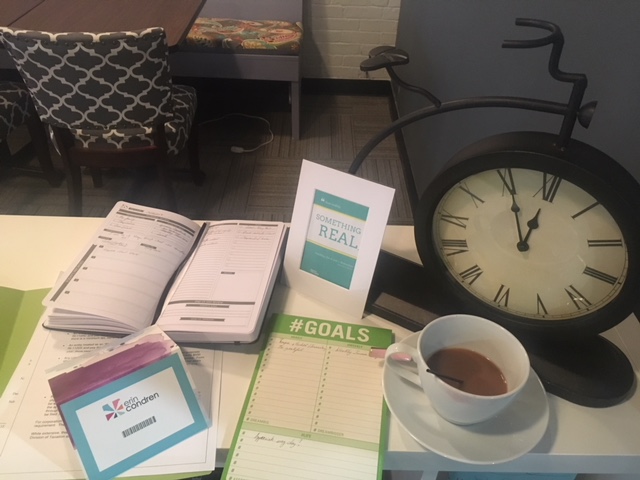
-
Write and read to enhance your personal growth
If you’ve ever felt unsure, down or depressed, you know how writing down your feelings and thoughts can improve your mood. Even better, it can help significantly enhance your personal growth. There’s a reason why it’s called “writing therapy“. I journal daily as a mental and spiritual practice to help me process my emotions, get clear on my strategy and grow through what I go through.
Have you also noticed how refreshing it is to read on paper? As a matter of fact, reading on paper has been proven to help improve memory and increase mental development. My most relaxing moments are spent with a physical book such as the entrepreneurial masterpiece Rework. That’s why I challenge myself to read as much as I can every single day, even if that means hiding in the bathroom away from the kids. To challenge yourself to read more, you can join here to take the pledge to read 15 pages a day.
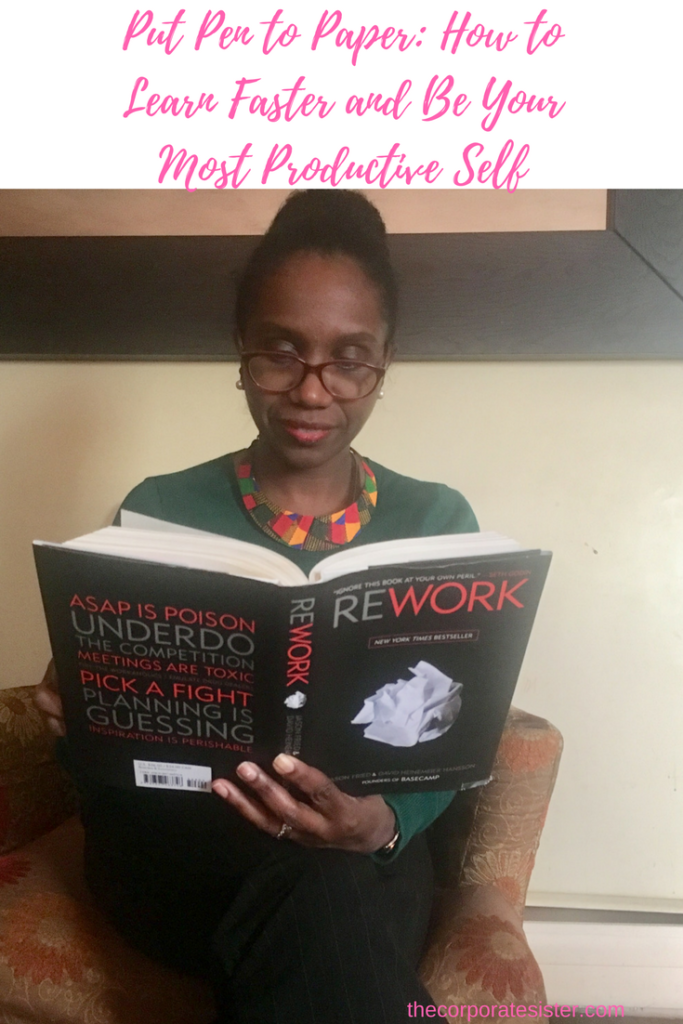
-
Put pen to paper to achieve your goals
Writing down your goals and objectives is a great way to clarify them. It also empowers you to pursue them with added resolve. Best-selling author and entrepreneur Tony Robbins advises going further than just thinking about your goals, and actually writing them down.
There’s something about writing down your objectives that not only motivates you to achieve them. It also allows you to check back on them and track your progress, in addition to keeping distractions at bay, including messages, apps and videos. I love doing so and enjoying the experience with fun tools such as the pre-sharpened, original hardwood pencils from the General Pencil Company.

-
Use paper to slow down and refuel
Have you noticed how many apps exist to actually help you shut down the noise of technology? There are actually many tools available to mute notifications from computers and smartphones, and help you be tech-free for a while.
As much as I love using technology, I make it a point to step away from it periodically, tune out and put pen to paper to slow down and refuel. One of my favorite daily activities is journaling, which helps me process my thoughts and emotions and get more clarity on my goals.
Another one of my absolute favorite things to do is reading. For me, there’s nothing like the smell and feel of a traditional paper book to get in my relaxed zone. Despite being a busy mom, I try to make the time to read at least a half-hour every day. You can do the same by taking the pledge to read 15 pages a day.
-
Increase your creativity with paper
According to Gretchen Rubin, author of The Happiness Project, even the simple act of jotting down notes on paper helps cultivate your creativity. As a creative person, I’m always amazed at what happens when I start putting pen to paper. Ideas I may not have thought about previously unexpectedly come out and new creations emerge.
Even for non-creatives, writing things down can spark unusual inspiration and creativity. It’s the reason why I carry a planner or notebook like the Panda Planner along with me at all times. Not only is it easier to transport than a computer, there’s also no worrying about finding a power source in case the battery dies.

-
Boost your career with writing
Using paper can make all the difference in your job search and career. Sending a written thank you note after an interview adds a distinctive touch that makes you stand out in a sea of emails. Similarly, written thank you notes foster positive relationships while at work. It’s a personal step that sets you apart from the crowd, and impacts your relationships significantly. I personally love the Erin Condren notecards for their professional and elegant look. A thoughtful thank you card may just be the lasting touch that gets you the job, or helps you finalize the business deal. It also activates feelings of gratitude in you, which keep your brain healthy and happy. An overall win-win…
In addition, lessening your dependence on technology can help you avoid losing precious documents or ideas due to lack of power or unavailable wi-fi. Don’t let a low battery or missing wi-fi signal keep you from writing down a great idea so you don’t forget it, or foregoing hours of work as a result of technical issues.

-
Get organized
While there are many electronic to-do list options available, paper to-do lists are still more efficient. An electronic to-do list can easily be lost behind another screen, but a paper list provides an easier visual cue you can keep on hand to remind you of what you have to do. Additionally, a paper to-do list motivates you to achieve your goals faster, so as not to have to rewrite them.
I’m obsessed with the Knock Knock Goals notepad, as a fun way to list my goals and keep them visible all day long. As a Certified Public Accountant, it’s also important for me to keep track of all my business documentation by using file folders such as the Carson Dellosa smart and colorful file folders.
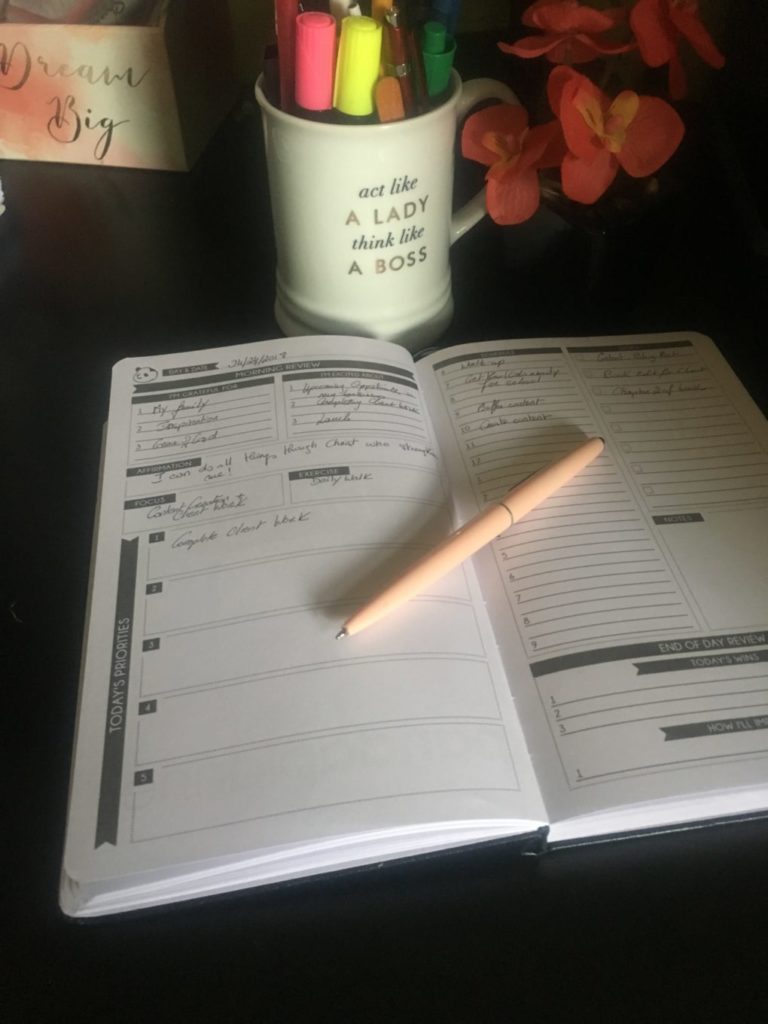
-
Get happier
Overall, using paper to write about your goals, process your emotions, list your tasks, and so many other written activities, can generally make you happier. According to this 2011 study, such writing can foster increased well-being, as well as decreased incidences of illnesses.
There’s power in being able to shut down the noise around you, focus on your goals and engage in a process of creativity that pushes you to be your best self.

In conclusion, using paper is a powerful way to balance out your use of technology and tune out the external noise for greater productivity and focus. Fostering your personal growth, learning faster, and living better can be as simple as putting pen to paper. Let’s start today…
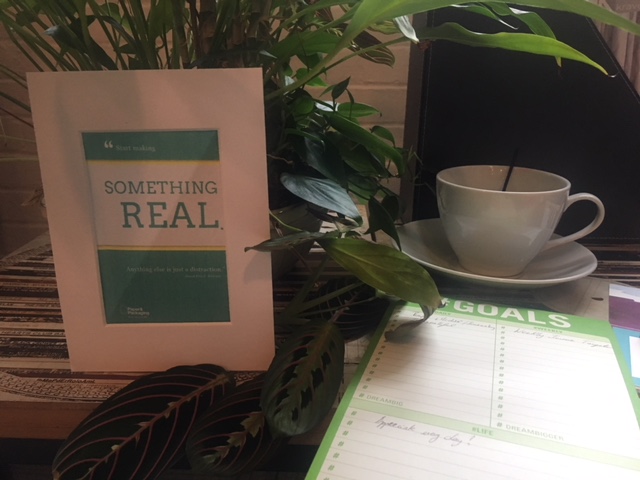
For more inspiration on being your most productive and best self, visit 15 pages a day.
To Your Success,
The Corporate Sister.

by Solange Lopes | Apr 3, 2018 | Career

How to practice self-care at work
As our careers and lives get busier by the minute, self-care is becoming a priority for most of us. Constant work demands, fast-paced environments, and distracting social media leave us perpetually frazzled and stressed.
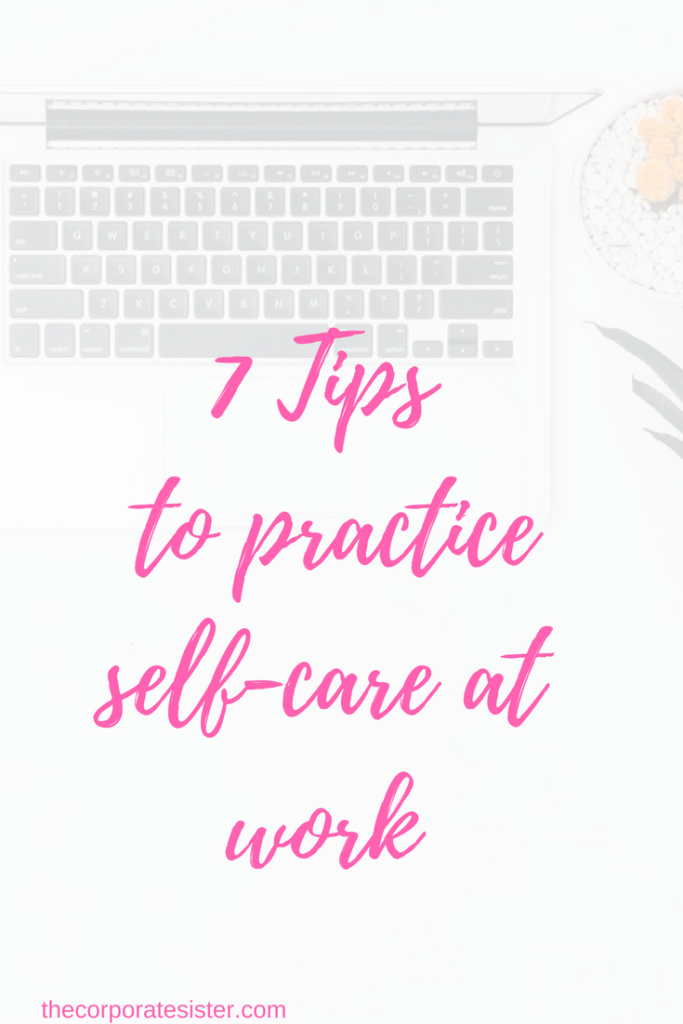
Yet, one of the biggest obstacles to practicing self-care is finding the time to actually do it. Since most of us spend the majority of our time at work, here are 7 steps to practice self-care right in our work environment:
-
Give yourself a break
We tend to be our harshest critics, which takes a toll on our mental and emotional well-being. Instead of constantly criticizing yourself, start seeing the positives. Would you be as hard with your fellow co-workers as you are with yourself? Refrain from judging yourself or your work harshly. It will boost your confidence and lessen the weight of self-doubt on you.
-
Change your workspace
It’s no surprise that your work environment has a huge impact on your productivity. Instead of being surrounded by clutter, consider cleaning your desk periodically. It will help you gain more clarity while eliminating unwelcome distractions.
Get inspired by putting up pictures, images and artwork representing people and things that matter to you. Overall, if your workspace is not a reflection of yourself, it may be time for an update.
-
Surround yourself with the right people
A crucial component of self-care is being around the right people. You must surround yourself with healthy, supportive and positive relationships that push you to reach higher.
Is your team supportive of your goals? Who around you at work drains you? Who, on the other hand, motivates and feeds you? Spend more time with those co-workers and colleagues who inspire and support you. The same goes for your relationships outside of work as well. Nurture these relationships by taking time to check on your loved ones.
-
Manage your emotions
One of the biggest mistakes so many of us make at work is to repress our emotions. Instead of avoiding the reality of your feelings, acknowledge and learn to manage them. Emotions are here to guide us to better understand ourselves. The more authentic you can be, the more fulfilled and successful you’re likely to be.
-
Honor your value
In any given workday, other people will make demands on us. Whether they require our time, energy or resources, frequent external requests will leave us distracted and frazzled. As a result, we end up not taking care of ourselves or tending to our priorities.
Take some time at the beginning of each day to set out and write down your goals for the day. Make a decision throughout the day as to which requests from others you can afford to attend to. If they go against your priorities and goals for the day, you may want to start saying no!
-
Recharge!
You simply cannot function on empty. Your cup has to be filled in order to contribute to your life, career and other responsibilities to the best of your potential.
Refill your tank by getting the adequate amount of sleep every night. Consider taking frequent breaks during the day. If possible, take lunch breaks away from your desk.
-
Learn to celebrate yourself
Many of us fail to celebrate our accomplishments and victories, in life and at work. We’re simply too busy to stop and ask ourselves: “What did I do well today, last week, last month, or even last quarter?” Consider asking your team and colleagues at work the same question.
Celebrate the positives, and learn from the areas in which you can improve.
What would you add to this list?
To Your Success,
The Corporate Sister.
by Solange Lopes | Feb 25, 2018 | Career

Black Panther movie – Photo credit: bustle.com
There are many reasons why Black Panther is a classic, historical, boundary-breaking movie. As an African and a Black woman, seeing my children’s faces represented on the big screen as the heroes they are, showed me how important this movie is. The powerful representation of women was also a strong testimony to the importance of female leadership, especially when it comes to Black women and women of color.
One of the biggest and most impactful aspects of Black Panther was its female ensemble of women warriors and leaders. The fearless female characters played by Angela Bassett, Danai Gurira Lupita Nyong’o, and Letitia Wright demonstrated that women can not only lead, but they they can defend an empire or organization like no other. From the revolutionary spy Nakia (Lupita Nyong’o), to the army general Okoye (Danai Gurira), to Wakanda’s chief scientist and sister of the king Shuri, not to mention the Queen Mother (Angela Bassett), these women make up the very foundation of Wakanda’s society.

Most importantly, their work and undeniable leadership teach us a few precious career lessons as working women. Here are five of them I took out of the movie:
-
Be dedicated to your purpose
One thing that is evident throughout the movie is the women’s passionate dedication to their purpose. Nakia, one of Wakanda’s most trusted spies, is devoted to helping oppressed people and protecting Wakanda. Okoye, the “general”, is the head of the Dora Milaje, the army of women warriors in charge of protecting King T’Challa. She is also dedicated to Wakanda, at the risk of losing her own love W’Kabi after he decides to betray King T’Challa. Shuri, the “smartest woman in the world”, is committed to fighting for Wakanda through the power of technology. These are a few examples of the power of Purpose in the lives of the women of Wakanda.
How much more effective would we be if we, as working women, were also unwavering in our purpose? Very often, society has us believe in the obstacles to achieving our career purpose, more than in our capacity to overcome them. The women of Wakanda show us that unwavering dedication ultimately wins!
-
Don’t be afraid to communicate fearlessly
If there’s one thing that the women of Wakanda don’t do, is mince their words! From Shuri’s witty replies to Okoye’s authoritative commands, they don’t shy away from expressing their opinions. It is by standing by their principles and using their voices that they’re able to bring about change and victory.
What if, like them, we hesitated less when it came to sharing valuable knowledge and empowering opinions? What if we stepped into rooms traditionally reserved for men, like Okoye as the head of the army, or Shuri as a leader in STEM, with confidence and natural authority? It’s only by asking what we want that actually stand a chance of getting it.
-
There is no such a thing as male-dominated fields
If you ask me, Disney should start working on a Shuri princess pronto. This witty genius in the movie is the perfect advocate for girls and women in STEM. Think of how many young girls are now dreaming of creating technological wonders like Shuri. Think of all the girls and women of color who now consider it normal to see themselves heading a laboratory and making strides in science.
What if we stopped considering certain fields or areas as reserved to men? What if we ventured into traditionally male-dominated fields and shared our expertise? The best way to break barriers is to act as if they didn’t exist in the first place.
-
Intelligence and strategy beat power
From Shuri’s brilliance to the Dora Milaje’s army strategy in battle, the women of Wakanda display increadible intelligence throughout the movie. While their attractiveness is evident, it’s their mind and skill that call our attention.
As working women, it can be easy to discount our intelligence and strategic powers. We often think that the powers at play, especially in our careers or businesses, cannot be overcome. However, intelligence and strategy, skillfully used in our work, can open doors for us.
-
Show up just as you are
Authenticity is the signature power of the Wakandan women. While there are many layers to their characters in Black Panther, they never fail to show up just as they are. As strong and purposeful as they are, they also don’t shy away from assuming their emotions. They’re comfortable in their skins, and not afraid to face controversy.
How many times do we, as working women, feel compelled to wear a mask at work? We often think that adopting certain behaviors or even a certain voice, can help us be more successful. What if, instead, we unapologetically and fearlessly showed up as who we are? There may be places where we may not be accepted. However, our impact would be multiplied in the right environments.
-
The power of resilience is real
After T’Challa is defeated by Killmonger and is believed to be dead, it’s the women of Wakanda, including the Queen Mother, Nakia and Shuri, who seek ways to save the nation. Despite being distraught and at a loss, they decide not to quit. It is thanks to their resilience that King T’Challa is brought back to life and the nation rescued.
As working women, our professional paths can be long, winding roads filled with obstacles. We may be tempted to quit or give in to the pressure as we go. However, being persistent and resilient in our careers or businesses is what really helps us accomplish our ultimate goals.
-
Organizations with women in leadership always win
Last but not least, one of the most important lessons Black Panther teaches us all is that organizations with women in leadership ultimately win. From the female elders to the Queen Mother, not to mention the general Okoye, Nakia, and Shuri, the women of Wakanda are the foundation of their society. It is thanks to them that the nation is flourishing and ultimately saved.
This goes to confirm what modern studies and statistics have clearly demonstrated. Any organization with women at the top is bound to succeed.
What do you think is the most important lesson that Black Panther teaches us as working women?
To Your Success,
The Corporate Sister.

by Solange Lopes | Feb 6, 2018 | Career |
 You know that feeling that overtakes you every time you’re getting close to achieving a goal or objective? That sudden need to procrastinate, the urge to collect all possible negative thoughts about yourself and whatever project you’re working on at the moment? These are all signs that you’re about to sabotage yourself.
You know that feeling that overtakes you every time you’re getting close to achieving a goal or objective? That sudden need to procrastinate, the urge to collect all possible negative thoughts about yourself and whatever project you’re working on at the moment? These are all signs that you’re about to sabotage yourself.
Many, if not most of our goals in life, career or business, get unfinished because we tend to sabotage ourselves in the process. We may set the most effective, realistic and functional goals, and still come up short. This is not for lack of skill, motivation or even aptitude. It’s simply because of self-destructive behaviors that keep us from taking action towards our goals and dreams.
I’ve struggled with procrastination quite a bit because I couldn’t recognize the self-sabotage behind my sudden drops in motivation and drive. It took me a while to recognize that one of the hardest battles I would have to wage would be against my own self, to stop destroying my own efforts. For many of us, it stems from a fear to succeed, which is often stronger than the fear of failure.

Here are a few ways to cut to the chase and stop sabotaging yourself in life and at work:
-
START with understanding your self-sabotage patterns
Everyone has different patterns in life and at work. Often, we fail to recognize when we’re self-sabotaging, because it feels comfortable and routine to do so. For most of us, there are specific areas in which we often unconsciously ruin our own efforts.
Review the different areas of your life and work, and start identifying the ones in which you’re practicing self-sabotage. It may be in your finances, career, relationships or health. The fact that you’re sabotaging yourself in any of these areas means that you may be struggling with some form of anger, shame, or sense of not being worthy enough.
Interestingly enough, as much as I love writing, I realized that the fear of failure would paralyze my writing efforts and make me less productive. It became clear that I was scared of being rejected, or looking ridicule because of my writing. It was only when I could face this truth about myself that I was able to fight my negative patterns and progress in my writing.
-
STOP delaying
One of the most prevalent effects of self-sabotage is constant delaying. You may find that you put off tasks to the next day, and let negative thoughts paralyze you into inaction. For instance, procrastinating before an important meeting, or leaving a crucial assignment to the last minute, is a clear sign of self-sabotage.
Instead, consider tackling your to-do’s as soon as you can, instead of postponing them to a later time. The more you impose this to yourself, despite the negative thoughts and patterns you may be subject to, the more you will fight your tendency to self-sabotage.
-
START facing your feelings
For many of us, facing the feelings of unworthiness, shame or anger that lead us to self-sabotage is a no-no. Instead, we tend to suppress them, pretending they don’t exist. As a result, our negative and self-destructing behaviors continue, ruining our best efforts in the process.
It takes a lot of courage to admit to oneself our fears and failures. However, it’s the only way to address them and fight them successfully. I had to admit to myself, and others around me, that I was afraid to be ridiculed because of my love for writing, or for being an introvert. Yet, the minute I could face these fears, I was free to recognize and address these demons. Once you know your areas of improvement, no one can hold them against you.
-
STOP dwelling on the past
So many of us are still prisoners of our past, especially when we feel like we’ve failed or haven’t measured up to some ideal we had for ourselves. Instead of focusing on the present, we stay in “If only” land, playing and replaying failed scenarios.
You can’t start over with a clean slate if you keep replaying the past. You have to be able to move on, and make peace with whatever has happened. A great trick is to write yourself a letter in which you forgive yourself for any and everything you’re still holding against yourself, or others. And move on, once and for all..
-
START journaling
Journaling is a powerful way to spot those instances when your mind start bullying you and you fall into the self-sabotage trap. I find that expressing my thoughts in a free and unrestrained way, allows me to free myself of the mental and emotional baggage we all carry.
Just remember there are no rules to journaling. You can write freely and express yourself unabashedly. While it may be intimidating at first, it will help you release some of the negative thoughts and emotions you may be feeling. You’ll start seeing more clearly where your blocks are, so you can address them better.
-
STOP comparing yourself to others
Comparison is really the thief of joy. It’s also one of the biggest ways in which we sabotage ourselves. Instead of being motivated to do better, we tend to feel unworthy or inadequate. By comparing, you limit your own beauty, effectiveness and potential.
Identify those areas in which you tend to compare yourself with others, and face them head on. If social media or certain relationships trigger you to compare yourself to others and feel less than, consider distancing yourself from them. Focus on YOU and the unique gifts and abilities YOU have been given.
-
START speaking kindly to yourself
Faith comes by hearing. It also means that what you say to yourself, you tend to believe. Start speaking more kindly to yourself, and honoring the positive about you, instead of emphasizing the negative.
Start observing how you talk to yourself, whether through your own mental chatter or through the words you use about yourself. You’ll start noticing how unloving you can be towards yourself. We all are. Begin to consciously turn negative thoughts and words into more positive chatter, and watch the difference.
How do you stop self-sabotage in your life and work?
To Your Success,
The Corporate Sis.
























